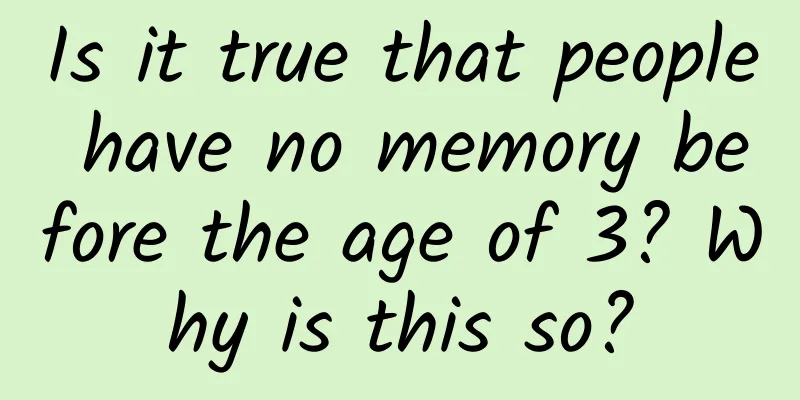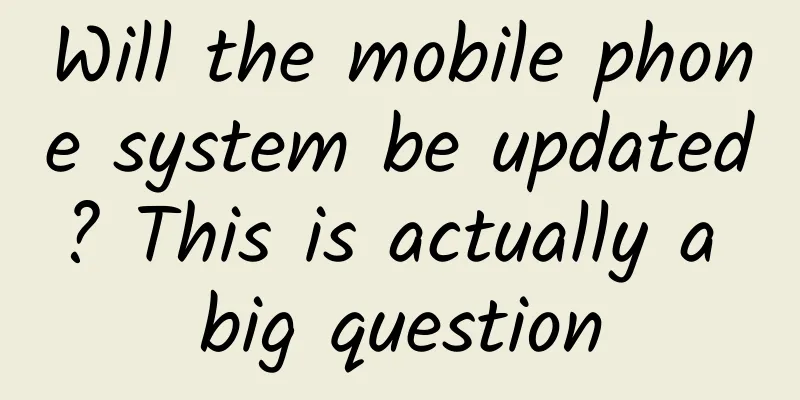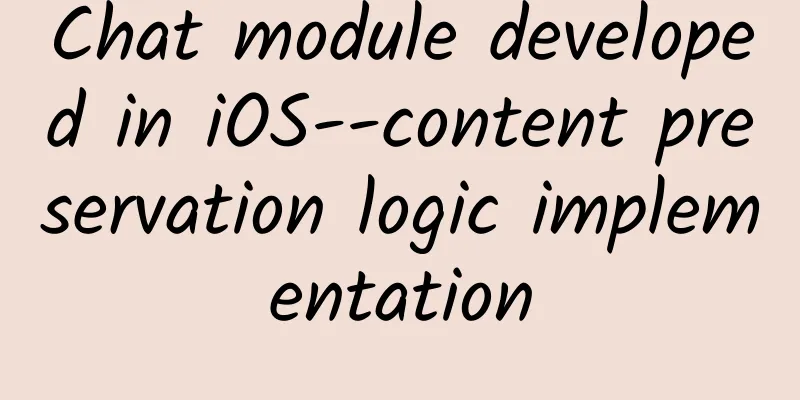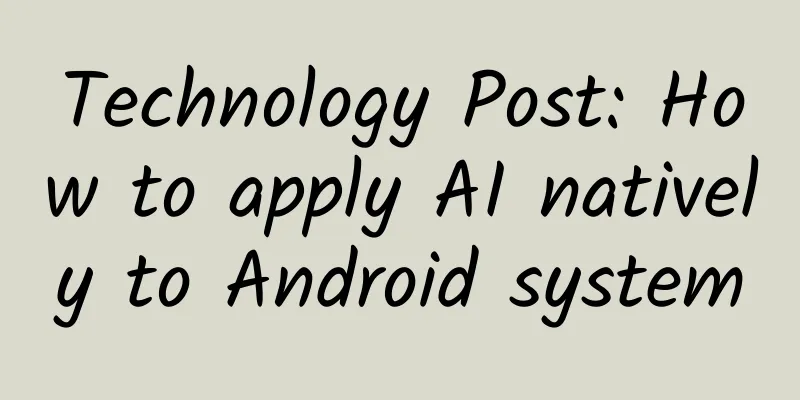Is it true that people have no memory before the age of 3? Why is this so?

|
I have talked about people’s childhood memory problems many times in the past, but seeing that many friends on the Internet are still confused and interested in this issue, I will summarize it briefly again and try to make it clearer. Whether it is philosophy or physiology, it is believed that consciousness is a mechanism unique to the human brain and is the reflection of the world by the human brain. This sentence means that consciousness is human's understanding of the world. Without the world, there would be nothing in human consciousness. Memory is a part of human consciousness. In detail, consciousness includes self-consciousness, experiential memory, and logical thinking. Self-consciousness is the basis of the entire consciousness, and therefore also the basis of memory. That is to say, without self-consciousness, there is no experiential memory, and no logical thinking. But even with self-awareness, thinking and memory still require tools. Without these tools, it is still difficult for humans to form thinking and memory. So, what is self-awareness? Self-awareness can also be called self-cognitive awareness. It is not unique to humans, but only humans have it most clearly and maturely. In layman's terms, self-awareness is the awareness that one knows that one is oneself and that one is different from others and other objects. In this way, we should be able to deduce that without self-awareness, if we cannot even tell ourselves apart as ourselves, let alone distinguish ourselves from other people or other objects, how can we think and remember? Human self-awareness is brought from the mother's womb, which means that it is gradually engraved in the genes after millions of years of evolution. However, this kind of inheritance is only genetic inheritance, and it is not shown at birth, but gradually shows up as the baby grows and matures. This is a bit like some people have genetic defects in their genes, which can induce certain diseases, but the diseases caused by these defects will only appear as people grow older. Research and experiments have shown that human self-awareness only gradually emerges 18 months after birth, and it gradually matures and becomes clear through the gradual accumulation of experience in understanding the world and the support of thinking tools. For this, friends who have babies at home can do a small experiment before and after the child is under 18 months old. The simple method is: when the child is not aware or asleep, make some obvious marks on his (or her) body that he (or she) cannot see directly, and then let him (or her) see these marks in the mirror to see if he (or she) can find the marks on his (or her) body based on the marks he (or she) sees in the mirror. If you have this kind of reaction, it means you have self-awareness, otherwise you don't. This experiment is called the "mirror test". Scientists have conducted mirror tests on some animals. Very few animals passed the mirror test, including orangutans, macaques, bottlenose dolphins, killer whales, elephants, European magpies, crows, pigeons, pigs, etc., which shows that they have a certain degree of self-awareness. What’s funny is that in the mirror test on pigs, 8 pigs were tested, 7 of them passed the mirror test, but only one was so stupid that it failed, so people called this pig "stupid pig". However, since most pigs passed the test, we cannot blame the entire "pig tribe" for one "stupid pig". People still classify pigs as "smart" animals with self-awareness. As a result, some foreign netizens called for a stop eating pork. And to the surprise of many people, dogs and cats, which humans have always thought to be very smart, did not pass the mirror test, which means they are dumber than pigs. Studies show that babies generally fail the mirror test before 18 months of age. What are the tools of memory and thinking? Although some animals also have self-awareness, why haven't they developed to a mature stage and become smarter? This is because the biggest difference between other animals and humans is that, in addition to the self-awareness passed down in their genes, they also lack the tools for memory and thinking. This tool is language and time concept. After hundreds of thousands of years of evolution and learning, humans have formed a rich and complete language system, and the most important cell in various languages is the concept. Concepts are abstract expressions obtained by abstracting the common essence of things and summarizing them in the process of human cognition of the world, from perceptual cognition to rational cognition. As long as these expressions appear in the mind, people can construct the image of the object. Concepts are formed on the basis of clearly distinguishing oneself from other objects, and are therefore a high level of expression of self-awareness. In layman's terms, concepts are the various words we come into contact with in daily life, such as nouns, verbs, adjectives, etc. These concepts are the most basic building blocks of human thinking and memory cognition, just like bricks for building walls. Without these concepts, humans cannot build up thinking and memory. Different regions and countries in the world can communicate smoothly through translation, even though they speak different languages. This is because humans have formed a unified understanding of concepts. For example, tables, stools, cars, trains, houses, rooms, eating, going to the bathroom, going to work, getting off work, etc., no matter which country people are from or what language they use to communicate, these concepts are roughly the same through translation, so that people all over the world can communicate, and human thinking and memory have building materials. In addition to language concepts, humans have also developed a concept of time and a unified time scale through their understanding of nature over millions of years, such as 365 days in a year, 24 hours in a day, 60 minutes and 3,600 seconds in an hour, etc. This makes communication and thinking more organized and sequential, and adds a time label to thinking and memory. Just like a large warehouse filled with goods, time is the label on these goods, which enables humans to find the one they need at any time among the messy items. Language and time are tools that are unique to humans and cannot be compared to other animals. Only when a person grows up gradually and continuously gains experience in understanding the world, and his language and time concepts become more and more mature, will his self-awareness become more and more mature and clear, and his thinking and memory will gradually form and become more and more mature. Some people always say that animals also have clear memory and thinking. After seeing these complicated processes, do you still think so? Without language and time tools, we cannot think, let alone form memories. Now, each of us can test ourselves to see if we can think and remember without the basic tools of language and time. We will find that we cannot do it at all. For example, there is such a passage in our memory: On May 6th of the year before last, my friends and I went to the End of the Earth in Hainan and had a great time. However, one of my friends fell ill at the time, so the trip ended early in order to send him to the hospital. How many concepts and time markers are there in this passage? The year before last, May 6, then, and very early are all time concepts. We need to distinguish the details here. There are also morning, afternoon, what time it ends, how many hours we played, etc., which may all need to be marked in memory; I, friends, once, Hainan, the ends of the earth, play, happy, sick, hospital, end, etc. are all concepts. It is these concepts that transform memories from images into abstractions and pile up in the mind. The details of these concepts also include friends' names, etc. When needed, they are extracted based on human experience and restored to the pictures of memory. These memories must be based on self-awareness and thinking. It is a process of transforming figurative thinking into abstract memory based on distinguishing oneself from other things. This process is full of people's understanding and experience of the world. Different people have different understandings and experiences of the world, so memory storage and recall will be different. Before the age of 3, humans have neither a complete and clear sense of self-awareness nor mature language concepts. They also have little knowledge of the world and life experience, and are unable to form abstract thinking, and of course cannot form clear and complete memories. However, some smart babies who develop self-awareness early and have language learning ability early may have some memories before the age of three, but they are also illogical and fragmented. It is generally believed that after the age of 7, children gradually gain a certain understanding of the world and begin to build logical memories. Do you agree with my point of view? Welcome to discuss, thank you for reading. The copyright of Space-Time Communication is original. Infringement and plagiarism are unethical behavior. Please understand and cooperate. |
<<: The first dog to go into space died peacefully after seven days of orbiting the Earth?
>>: What is the significance of biodiversity to humans?
Recommend
Can't get up in the morning, and feel tired when you wake up? Maybe your alarm clock is not set correctly! Your health will get worse and worse...
The most painful thing in the world Nothing is be...
New media operation: graphic design, in-depth IP creation
For operational promotion, the most important thi...
@2022 College Entrance Examination, please accept this college entrance examination tips
The 2022 National College Entrance Examination is...
Learn this trick and you won’t lose money betting on football!
Economics is everywhere in our daily life. They s...
Ancient Communication: The Beginning of Information Communication
Animals also communicate with each other, but it ...
Impressionist paintings are hazy and fantastic. Are they the result of smog or eye disease?
In many people's impressions, the paintings o...
Momo and Tantan: The secret behind a 60% monthly user retention rate
When it comes to domestic stranger social softwar...
The next generation of search engines from the perspective of advertising logic
Case: A reader asked about a financial management...
International Day of Forests丨What can we do to protect the “lungs of the earth”?
Hundreds of millions of years ago A group of alga...
Locking the list, what is Apple doing? A bold guess
As of the afternoon of January 5, the App Store h...
What is the deposit for Douyin showcase? Can I retreat later?
This article mainly introduces the relevant infor...
The "weird and beautiful photos of the sky" before the Taiwan earthquake sparked heated discussions! Are there really "earthquake clouds"?
According to official measurements by the China E...
App launch growth: user awakening methods
In daily App promotion , attracting new users and...
Superconducting quantum computing: the vanguard in quantum error correction
Produced by: Science Popularization China Author:...
NSA cracks German Chancellor's encrypted phone again
German media reported that the US National Securit...









